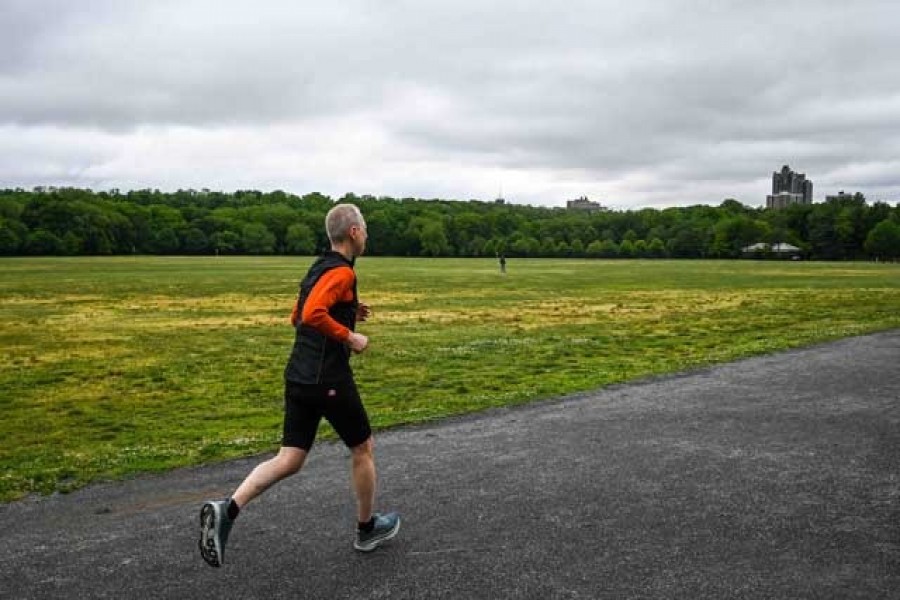
Published :
Updated :

A new paper has shown the capacity of the human body to burn calories, or our metabolism, does not generally decrease as we grow old, overturning previous assumptions. Rather, it suggests, our metabolic rate depends on our lifestyle, reports bdnews24.com citing CNN.
The paper, published in peer-reviewed journal Science, analysed data from nearly 6,500 people ranging in age from infancy to elderly, and determined that resting metabolism holds steady from age 20 to 60 before logging a decrease of less than 1 percent per year thereafter, according to a CNN report.
The paper also found no real differences between the resting metabolic rates of men and women, even for menopausal women, when controlling for other influences.
This means that the generally accepted belief that the resting metabolism of humans slows with age is not true.
But those who feel their bodies aren’t burning calories the way they used to can boost their metabolism by changing their lifestyle, regardless of age. Here are some tips, backed by science:
BE ACTIVE DAILY AND THROUGHOUT THE DAY
Our metabolism can slow down when our daily activity level has slowed down. Along with other health risks associated with prolonged sitting, experts point to consistent inactivity as the biggest reason that slackens our metabolism.
"Being sedentary most of the day markedly reduces fat metabolism," Edward Coyle, professor of kinesiology and health education at the University of Texas at Austin, told CNN.
Fat metabolism refers to the type of fuel we burn during resting metabolism.
Coyle, who is also the director of the school's Human Performance Laboratory, said his research has found that it is necessary to take at least 8,500 steps per day -- throughout the day, rather than all at once -- in order to maintain adequate fat metabolism.
Even if we do not have the time or opportunity to do intense workouts, simply getting up and moving a few minutes per hour can make a difference, he said.
Additionally, in his lab, Coyle has found that just five to four-second bursts of exercise performed at full effort every hour throughout the day can dramatically increase fat metabolism by as much as 49 percent.
DO EXERCISES THAT BOOST METABOLISM
High-intensity interval training (HIIT) and strength training have both been shown to have statistically significant impacts on metabolism.
HIIT is basically periods of intense exercise mixed with recovery periods. It has been shown to elevate our metabolic rate, specifically for fat burning, long after workout ends. One study found that, after 12 weeks of HIIT, overweight men reduced their belly fat by 17 percent and overall fat mass by two kilograms, which is comparatively more than alternate forms of exercise.
On the other hand, with strength training, one can increase the body's muscle mass, which helps to increase the metabolic rate.
Muscle building through strength training will continue to burn caloric energy regardless of how often we work out, as long as we are exercising enough to maintain muscle mass.
Strength training also helps in metabolic decrease, associated with dieting for weight loss. In a study of 48 overweight women on a diet of only 800 calories per day, strength training was shown to enable them to maintain muscle mass and metabolism, while those in the study who did only aerobic exercise or no exercise lost muscle and experienced decreased metabolism.
Mixing up weekly workout programs to include both strength training sessions and HIIT training sessions maximises our metabolic boost through exercise.
FUEL YOURSELF WITH PROTEIN AND WATER
Because it takes energy to process the food you eat, digesting actually increases your metabolism for a few hours. This is referred to as the thermic effect of food, or, TEF.
But that doesn’t mean you should eat more. It does, however, mean you should eat more protein. Protein causes the largest rise in TEF, increasing your overall metabolic rate by 15 percent to 30 percent.
Eating protein is essential for building and repairing muscle, which -- as shown above -- boosts metabolism. Additionally, eating protein helps you avoid muscle loss and the resulting decrease in metabolism that can come with dieting.
Registered dietician and Eleat Sports Nutrition owner Angie Asche, advised eating 20 to 25 grams of protein within an hour after working out.
That's equal to a 3-ounce chicken breast (24 grams of protein), one 7-ounce container of 2 percent Greek yogurt (20 grams) or one scoop of whey or plant-based protein powder (grams of protein varies depending on brand).
Drinking more water may also briefly raise metabolism. Research shows drinking 0.5 litres of water can increase resting metabolism by 24 percent for about an hour. Drinking cold water might lead to a larger boost in metabolism as energy is used to get it to body temperature.
GET THE REST YOU NEED
Sleep is essential for recovering and restoring your body.
Sleeping fewer than seven hours on a regular basis can have many negative health implications like weight gain, diabetes, hypertension, heart disease and stroke, depression, impaired immune function, increased pain, impaired performance, and greater risk of death, according to the American Academy of Sleep Medicine and Sleep Research Society.
Research published in the International Journal of Endocrinology says that sleep deprivation and reduced quality of sleep have a detrimental impact on metabolism.
To get the necessary it is important to create a nightly routine that includes strategies that facilitate rest, such as breathing exercises to help calm your nervous system. You can also practice yoga to prepare your body for sleep.


 For all latest news, follow The Financial Express Google News channel.
For all latest news, follow The Financial Express Google News channel.